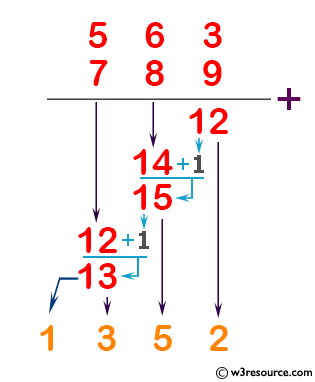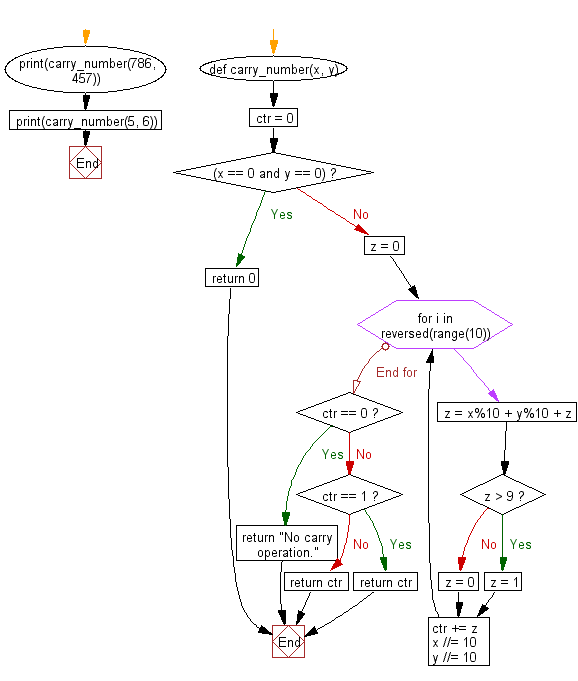Python: Count the number of carry operations for each of a set of addition problems
Carry Operations Count
Write a Python program to count the number of carry operations for each addition problem.
According to Wikipedia " In elementary arithmetic, a carry is a digit that is transferred from one column of digits to another column of more significant digits. It is part of the standard algorithm to add numbers together by starting with the rightmost digits and working to the left. For example, when 6 and 7 are added to make 13, the "3" is written to the same column and the "1" is carried to the left".
Visual Presentation:

Sample Solution:
Python Code:
# Define a function to count the number of carry operations when adding two numbers digit by digit.
def carry_number(x, y):
# Initialize a counter for carry operations.
ctr = 0
# Check if both numbers are zero, in which case there are no carry operations.
if x == 0 and y == 0:
return 0
# Initialize a carry digit to zero.
z = 0
# Loop through each digit from right to left.
for i in reversed(range(10)):
# Sum the current digits of x, y, and the carry digit.
z = x % 10 + y % 10 + z
# Check if the sum is greater than 9 (carry condition).
if z > 9:
z = 1 # Set the carry digit to 1.
else:
z = 0 # Reset the carry digit to 0.
# Increment the counter based on the carry digit.
ctr += z
# Move to the next digit by removing the last digit of each number.
x //= 10
y //= 10
# Check the counter to determine the result.
if ctr == 0:
return "No carry operation."
elif ctr == 1:
return ctr # Return the count of carry operations.
else:
return ctr # Return the count of carry operations.
# Test cases
print(carry_number(786, 457)) # Example with carry operations
print(carry_number(5, 6)) # Example with no carry operations
Sample Output:
3 1
Explanation:
The above Python code defines a function "carry_number()" that calculates the number of carry operations when adding two numbers digit by digit. Here's a brief explanation:
- The function "carry_number()" takes two integer arguments, x and y, representing the numbers to be added.
- It initializes a counter variable ctr to keep track of the number of carry operations.
- It checks if both input numbers x and y are zero. If so, it returns 0 since there are no carry operations in this case.
- The function uses a loop to iterate through each digit position, from right to left (units place to higher places).
- Inside the loop, it calculates the sum of the current digits of x, y, and the carry digit z.
- If the sum is greater than 9, indicating a carry, it sets the carry digit z to 1; otherwise, it resets z to 0.
- It increments the counter ctr based on the value of the carry digit.
- The loop continues until all digits have been processed.
- After the loop, the function checks the value of ctr to determine the result:
- If ctr is 0, it means there were no carry operations, and the function returns "No carry operation."
- If ctr is 1, it returns 1, indicating a single carry operation.
- If ctr is greater than 1, it returns the count of carry operations.
Flowchart:

For more Practice: Solve these Related Problems:
- Write a Python program to count the number of carry operations in the multiplication of two large numbers.
- Write a Python program to simulate subtraction and count the number of borrow operations required.
- Write a Python program to perform a series of additions and accumulate the total number of carry operations across all steps.
- Write a Python program to determine the maximum consecutive carry operations occurring in a single addition problem.
Go to:
Previous: Write a Python program to reverse the digits of a given number and add it to the original, If the sum is not a palindrome repeat this procedure.
Next: Write a python program to find heights of the top three building in descending order from eight given buildings.
Python Code Editor:
Have another way to solve this solution? Contribute your code (and comments) through Disqus.
What is the difficulty level of this exercise?
Test your Programming skills with w3resource's quiz.
